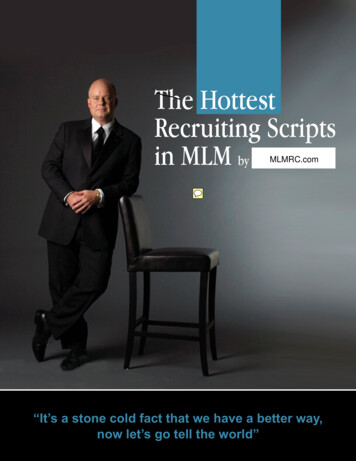
Transcription
PRESENTING: The 31 hottest proptech startups,as chosen by leading VCsBy Alex Nicoll, Daniel Geiger, Libertina Brandt, Natasha Solo-Lyons and Taylor BordenThe leaders of proptech startups (from left to right) Archipelago Analytics, Kasa Living, Local Logic,and Flyhomes are propelling the historically staid real-estate industry into the 21stcentury. Archipelago; Kasa Living; Local Logic; Flyhomes; Skye Gould/Insider Real estate has been transformed by the pandemic as the once traditionalindustry goes digital.The proptech field, which was already booming with real-estate techstartups, grew even more.We surveyed a set of venture capitalists to select of the 31 hottest proptechcompanies right now.Visit the Business section of Insider for more stories.
Real-estate technology, already booming with record fundraising before the pandemic,has been brought to center stage — and a fresh crop of proptech startups are ready fortheir star turn.Insider reached out to a varied set of venture investors that focus on real-estate andconstruction technology to ask for their nominations for proptech startups that willthrive in a new climate marked by swings in where employees live and what offices areeven for, as well as increased digital adoption by real-estate and constructionprofessionals.These factors have already minted some major success stories for proptech companiesthat focus on residential real estate (both renting and owning), industrial and logistics,and digital communication. After evaluating the VC nominations we received, weselected this list of the 31 hottest proptech startups of 2021.We excluded companies that have gone public or been acquired for major amounts, orthat clearly were the winners of their sections. We also strove to highlight firms thathave raised less than 200 million in order to keep the focus on startups that still haveplenty of room to grow.Their founders are largely white men, which reflects the realities of this sector, as well asthe real-estate industry more broadly — though trade groups like Women in PropTechare working to change that.We used the companies' self-reported fundraising numbers, but added in Crunchbasedata as a supplement for firms that declined to comment. We asked each startup for itsvaluation and revenue, but many declined to share that information, citingconfidentially and ongoing fundraising.Behold, the hottest proptech companies right now, presented in alphabetical order.
Archipelago AnalyticsHemant Shah, Archipelago Analytics' CEO. Archipelago AnalyticsCity: San FranciscoYear founded: 2018, but launched in AugustTotal funding: 23.2 millionWhat it does: Uses artificial intelligence to allow owners of commercial real estate tosee under the hood of their property insurance in order to make changes that reducetheir premiums.Why it's hot: Cofounder Hemant Shah is the longtime CEO of Risk ManagementSolutions, the largest risk-analytics company. The idea behind Archipelago is to allowowners of commercial real estate to see how their insurance risk is calculated. That givesthem concrete information they can use to make decisions to lower their risk and, as aresult, their premiums.The data that Archipelago gathers — from building-operations data to the blueprint of abuilding — is then used by insurers to underwrite plans that are more specific with lesseffort. The combination of a superstar founding team and innovative model has earnedthe company a lot of interest very quickly. Archipelago already counts the major realestate owners and operators JLL, Morgan Stanley, and MetLife as clients.
Beyond HQMadhu Chamarty, Beyond HQ founder & CEO. BeyondHQCity: San FranciscoYear founded: 2019Total funding: 1.75 millionWhat it does: Develops software to help companies figure out where and when theyshould open new offices.Why it's hot: Two years ago, Madhu Charmaty noticed that tech companies in the BayArea had tapped out the area's workforce. He figured they could use a tool to exploreother locations to set up operations and recruit talent, and Beyond HQ was born.Then the coronavirus crisis prompted a mass nationwide migration of employees freedto relocate by the widespread adoption of flexible and remote work schedules. Now ayear of pandemic work-from-home trends could further accelerate adoption of thecompany's software, which pools data from myriad sources to calculate how firms cancreate a footprint that best caters to a resettled employee pool and evaluate the costsand opportunities of entering new markets.Beyond HQ's 2020 revenue was 200,000, Charmaty told Insider, adding that heexpects to o more than double — to 500,000 — this year. The company is also close toraising another round of funding in range of 2.5 million to 3 million from venturecapital backers, a sum that would bring its total fundraising to nearly 5 million.
Bowery ValuationNoah Isaacs (left) and John Meadows, co-CEOs of Bowery Valuation. Bowery ValuationCity: New York CityYear founded: 2015Total funding: 26.8 million, according to CrunchbaseWhat it does: Build proprietary software that makes appraisals easier and moreaccurate.Why it's hot: An appraisal report is a requirement for any real estate transaction, buttypically takes two to three weeks to complete by a human appraiser using severaltedious tools and manual mechanisms, according to a 2019 Forbes profile of BoweryValuation. Founders Noah Isaacs and John Meadows are childhood best friends whogrew up in Berkeley.The 4-year-old startup has challenged the traditional appraisal process since itsinception by developing software that allows appraisers to calculate the value ofcommercial buildings cheaper, faster, and more efficiently than its competitors. With afocus on the intersection of engineering, design, and product, Bowery has an office inWashington, DC, and told Forbes that it is looking for appraisal talent across thecountry to lead new offices.
BriqBriq CEO Bassem Hamdy. BriqCity: Santa Barbara, CaliforniaYear founded: 2018Total funding: 16 millionWhat it does: Uses high-tech software and modeling to ultimately lower constructioncosts.Why it's hot: Many construction projects end up going over budget, and Briq's goal isto prevent that. The construction tech, forecasting, and resourcing company founded byBassem Hamdy and Ron Goldschmidt developed a fintech platform that uses data tohelp construction companies make smart purchasing decisions and better forecast theirfinancial futures. The platform helps contractors and subcontractors "identify outliersand which projects are at most risk," Hamdy told Crunchbase, adding: "The riskcoefficients calculate for them based on different financial factors, such as how they areusing funds such an allowance or contingency."The platform, which looks like Excel, catches errors or inefficiencies before they happen,whether they're in materials, labor costs, or other parts of the construction process. InMay, Crunchbase reported that the company's annual recurring revenue jumped 1,000%in the prior year. (The company told Insider its annual recurring revenue was 14million in 2020.) With single-family-home construction at a fever pitch during thepandemic and into 2021, the service is poised to be even more relevant.
Built TechnologiesChase Gilbert, the CEO and cofounder of Built Technologies. Built TechnologiesYear founded: 2014Total funding: 137 millionWhat it does: Builds financial-tools software for the construction industry, fromlenders to contractors.Why it's hot: Built Technologies had been deploying software to better connect lendersand their contractor clients for six years before the pandemic hit. In spring, when officesbegan to shut down and digital communication became paramount, these tools paid off.Built's customers were able to keep a better hold on their lending from afar. Like inother industries, the adoption of new tech sped up in construction during the pandemic.The company continues to build new applications, including Built Pay, which CEOChase Gilbert said was like "Venmo for construction." With the digitization ofconstruction processes poised to continue into 2021 and beyond, Built is well preparedto take advantage.
Clockwork AnalyticsNick Gayeski, the CEO of Clockwork Analytics. Clockwork AnalyticsCity: Somerville, MassachusettsYear founded: 2008Total funding: About 13 millionWhat it does: Analyzes data from building systems, including heating, ventilation, airconditioning, and boilers, to make recommendations to building owners that will reduceenergy use, prevent costly building repairs, and improve occupants' health.Why it's hot: Clockwork is one of the oldest companies on this list, but it found a newuse for its product — building-systems data — during the pandemic. The firm began byfocusing on recommendations for energy efficiency but found there was even greaterinterest in tips for preventive maintenance. Advice to building owners on when toreplace heating and cooling systems can save customers from huge surprise bills whenthose systems inevitably fail.With the onset of the pandemic, the company — led by CEO Nick Gayeski — addedanother feature: monitoring air quality. Keeping a building at the proper humidity andtemperature is paramount to stopping the spread of any virus. With many landlordslooking to control not only this pandemic but also whichever public-health threat comesnext, Clockwork has seen a wave of new interest — which led the company to raisemoney for the first time since 2016.
DarkstoreLee Hnetinka, Darkstore's CEO. DarkstoreCity: San FranciscoYear founded: 2016Total funding: 30.2 millionWhat it does: Operates urban microwarehouses, which sync with an app that allowsretailers to deliver their goods to customers within two hours.Why it's hot: As more shoppers move online — a trend that has accelerated during thepandemic — retailers have been under pressure to ship goods to them more quickly.Darkstore operates two e-commerce fulfillment centers, each about 5,000 square feet, inLos Angeles and New York City, giving it centrally located storage spaces that allowdelivery partners like DoorDash and Roadie to shuttle products to shoppers in thosecities within two hours.In September, it unveiled its own mobile app, FastAF, which provides retailers with adigital platform to sell products they stock with Darkstore. Its top-selling brand is Bala,an LA maker of fashionable home-exercise weights and accessories that have grown inpopularity as consumers work and work out from home.Next for Darkstore, according to its 33-year-old founder and CEO, Lee Hnetinka, isexpanding its offerings beyond the roughly 350 brands on its marketplace and bringingits services to new cities. Hnetinka wouldn't say how many shoppers have used FastAFbut said it was in the "tens of thousands" and that sales on its app had been growingexponentially since its launch.
Darwin HomesRyan Broderick and Zachary Kinloch, Darwin Homes' cofounders. Darwin HomesCity: Austin, TexasYear founded: 2018Total funding: 19.5 millionWhat it does: Provides tech-enabled property-management tools typically used by bigfirms to smaller landlords.Why it's hot: For real-estate investors, the biggest challenge in growing a portfolio ofrental units is being able to manage them efficiently. Founded by DoorDash cofoundersRyan Broderick and Zachary Kinloch, Darwin builds proprietary property-managementsoftware, which seeks to simplify landlords' lives with high-tech rental management.Other property-management software, they said, assume investors have their own teamsof professionals. And while some owners hire companies to run their properties, moreinvestors manage them on their own. "We believe that people want access to this assetclass, but they don't want a second job," Broderick, Darwin Homes' CEO, told Insider inJanuary. Darwin brings institutional-style real-estate management strategies — as wellas the higher yields and better deals from the vendors they attract — to the single-familyrental market.
DottidKyle Waldrep, the CEO and founder of Dottid. DottidCity: DallasYear founded: 2016, but it became operational in 2018Total funding: 3.85 millionWhat it does: Makes software for owners of commercial real estate that tracks leasesand offers asset-management tools, and serves the industrial real-estate segment, a firstfor the industry.Why it's hot: Led by cofounder and CEO Kyle Waldrep, Dottid parachuted into asubsector that has already minted one major proptech unicorn: VTS. The company'ssoftware helps owners of commercial real estate quantify the performance of theirassets. It enables leasing teams to track progress as leads and tenant interest turn intosigned leases, and it eventually monitors lease renewals, too. Like VTS,Dottid is useful for offices and retail spaces — but those areas of commercial real estatetook a major hit during the pandemic. With e-commerce levels at record highs,warehouses, factories, and storage spaces have seen a boost over the past year. Dottid'sdecision to launch an industrial platform should help the early-stage company gainmarket share from the investors who have their eyes trained on that asset class and willneed tools to manage their purchases.
FlyhomesFlyhomes cofounders Steve Lane and Tushar Garg. FlyhomesCity: SeattleYear founded: 2015Total funding: Over 70 millionWhat it does: Fronts buyers cash to bid on homes and provides other brokerage andmortgage services.Why it's hot: Under the Trade Up program, one of the next-generation real-estatebrokerage's most popular offerings, the company gives homeowners an estimated priceon their home. If Flyhomes is unable to sell the home for that price in 90 days, the firmbuys it at that price. That allows the homeowners to make an offer on a new home withFlyhomes' financial backing.Founded by Steve Lane and Tushar Garg, the firm also has an array of traditionalbrokerage services and lending vehicles that simplify and digitize the homebuyingprocess. Since launching, Flyhomes has bought and sold over 2 billion worth of realestate.
GoForBarry Lewis/InPictures via Getty ImagesCity: Ottawa, OntarioYear founded: 2016Total funding: 23.5 million, according to CrunchbaseWhat it does: Same-day last-mile logistics for the construction industry and othercompanies that require bulky deliveries.Why it's hot: One of the major reasons construction costs continue to rise whileproductivity stays flat is the coordination problem inherent in the industry. For projectsto go ahead according to plan, materials need to be delivered on time and in the correctorder.GoFor was founded as a logistics partner that caters to these specialized needs. Thecompany can even make same-day deliveries, rivaling Amazon's expertise with smallerconsumer retail products but instead ferrying much larger, more complicated items.GoFor already works with Home Depot, Ikea, and a variety of other suppliers. It has alsoannounced a partnership with Royale EV to deliver items using that firm's electric vans,in an attempt to lower emissions in at least one leg of construction, which is one of themost carbon-intensive industries.
Icon BuildingJason Ballard, the CEO of Icon. ICONCity: Austin, TexasYear founded: 2017Total funding: 59 millionWhat it does: Uses 3D printing to build homes at a fraction of the price of traditionalconstruction.Why it's hot: In 2018, the construction tech firm built the first 3D-printedneighborhood in Mexico. A 350-square-foot proof-of-concept home was constructed forjust 10,000 in 24 hours. (A home up to 2,000 square feet takes less than three days.)Icon built the first 3D-printed home in the US in 2019, then constructed an entire tinyhome village of 400-square-foot properties in 2020.Cofounder and CEO Jason Ballard considers 3D printing a way to combat homelessnessand increase affordable housing. It's a mission that is especially crucial during thepandemic, as many tenants who cannot keep up with rent fear eviction whenmoratoriums protecting them run out."Our hope is that this isn't a novelty," Icon cofounder Evan Loomis told Insider in 2019,"but this is actually the new way of construction for the future."
Juniper SquareAlex Robinson, the CEO of Juniper Square. Juniper SquareCity: San FranciscoYear founded: 2014Total funding: 85 millionWhat it does: Software platform for real-estate investors with a customer-relationshipmanager specifically designed for property investment.Why it's hot: Juniper Square had ascended to become a leading player in the realestate investment world before the pandemic, with a 75 million Series C fundraise atthe end of 2019.In a 2018 statement, the company touted its product as "modern, easy-to-use softwarethat automates one of the most critical business functions for investment managers:raising and managing outside capital." Since then, transaction and investment volumeshave fallen as a result of economic uncertainty. But as ramped-up vaccine distributionpromises a return to some normality, the biggest investors are raising money onceagain. Juniper Square, helmed by CEO Alex Robinson, is positioned to become the go-tosoftware provider for the post-pandemic real-estate-investment boom.
Kasa LivingRoman Pedan, Kasa's founder and CEO. Kasa LivingCity: San FranciscoYear founded: 2016Total funding: About 60 millionWhat it does: Leases out furnished apartments for short-term and long-term staysand partners with landlords by sharing rent revenue from tenants with them, instead ofsigning expensive and unforgiving leases to secure the apartments under its own name.Why it's hot: The company had already been shifting toward a shared-revenuemanagement partnership model before the pandemic and was able to pivot toward itquickly once the COVID-19 crisis hit. This was made easier by Kasa's emphasis onworking with institutional landlords, who are more familiar with this business model,over smaller landlords — and gave the company a large berth to grow in 2020, even asits competitors toppled.The firm has also focused on leasing spaces in residential hubs outside major urbancenters, setting up shop in places like New Haven, Connecticut, (90 minutes from NewYork City) and Alexandria, Virginia (just outside Washington, DC). Led by founder andCEO Roman Pedan, Kasa also targeted smaller metropolitan areas like Des Moines,Iowa, that have seen population booms over the past year.
LandedJonathan Asmis, Landed's CEO. LandedCity: San FranciscoYear founded: 2015Total funding: 75 millionWhat it does: Helps essential workers buy homes in communities where they work byproviding down-payment assistance.Why it's hot: By splitting a down payment with homebuyers, Landed's goal is to makehomeownership affordable for essential workers like educators and healthcare providersin notoriously expensive cities like San Francisco, Los Angeles, and Seattle.The coinvestment model, pioneered by CEO Jonathan Asmis, not only benefitsAmericans in need — who are especially overworked and burned out from the pandemic— but also works to keep residents with less-lucrative jobs from being priced out of theircommunities.
LandingLanding CEO Bill Smith. LandingCity: San Francisco and Birmingham, AlabamaYear founded: 2019Total funding: 145 millionWhat it does: Operates furnished apartments in 76 cities across the US available tocustomers who can rent spaces for flexible amounts of time.Why it's hot: In the age of remote work, Landing's offerings are particularly appealingto formerly office-bound professionals and other digital-nomad types who have tofreedom to pick their geographic home bases.Former residents of New York and San Francisco are flocking to cities like Nashville,Tennessee, Austin, Texas, and Charlotte, North Carolina, where Landing expanded in2020 to operate furnished rentals without restrictive 12-month leases. Customers, alsocalled members to give the air of a private club, are also allowed to easily relocate toLanding apartments in different cities. CEO Bill Smith sold Shipt to Target for 550million in 2017 and has recruited top hires to the C-suite, including major executivesfrom WeWork, Airbnb, and Oyo.
LatchelLatchel CEO Ethan Lieber. LatchelCity: Seattle, Wash.Year founded: 2017Total funding: 4.5 millionWhat it does: Offers round-the-clock services for property-management companies byhandling maintenance requests from tenants.Why it's hot: The startup, helmed by CEO Ethan Lieber, likens itself to Uber or Lyftbecause it responds to real-time maintenance requests made by residents by deployingavailable professionals in the area.The service covers everything from simple issues like blocked drains and brokenappliances to more concierge-level services like apartment cleaning and furnitureassembly. By providing an as-needed service to tenants, it frees up landlords' time andenergy.A Y Combinator alum, Latchel has lured investors like Bain Capital Ventures and israising its Series A round. Latchel told Insider it had a 16 million valuation cap in 2019.
LoanSnapKarl Jacob, the CEO of LoanSnap. LoanSnapCity: San FranciscoYear founded: 2017Total funding: 31 millionWhat it does: Uses artificial intelligence to analyze a customer's finances and thensorts through thousands of loan options to make payment forecasts and select the bestone for their needs.Why it's hot: LoanSnap is a "smart-loan" company that saves borrowers money — 35million in 2020 alone. After users enter in their financial information, the AI tool showsthem where they're losing money, sorts through thousands of prospective loans, andmakes a recommendation for the best one in just a few seconds, providing options forrefinancing, home-equity lines of credit, and mortgages that help users save money.By mostly automating the process of applying for a loan, LoanSnap has sped up theprocess. Loans can close in 15 days or less using its technology, which helps users get thecash they need fast. The company is led by CEO Karl Jacob and backed by top venturecapital investors, including the billionaire Richard Branson, the NFL great turnedinvestor Joe Montana, and Mantis, a tech-investment firm founded by the DJ duo TheChainsmokers.
Local LogicLocal Logic executives (from left) Gabriel Damant-Sirois, Amanda Levin, and Vincent-CharlesHodder. Local LogicCity: MontrealYear founded: 2016Total funding: 10 million Canadian dollars (equivalent to 7.93 million)What it does: Uses artificial intelligence to analyze data about geographic locations.Why it's hot: The company's goal is to help anyone who is considering a purchasebetter understand any given market in the US and Canada. Developers, investors,management companies, and homebuyers use details like property history, localdemographics, and walkability to make smarter real-estate decisions.Led by cofounders Gabriel Damant-Sirois, Amanda Levin, and Vincent-Charles Hodder,Local Logic also provides AI-generated market comparisons and special information forreal-estate brokers to enhance their listings. The company, which recently raised 8million Canadian dollars ( 6.35 million), has added to its offerings data points that areeven more granular than previously available, from local transportation trends to noiselevels.
MeetEliseMeetElise CEO Minna Song. MeetEliseCity: New York CityYear founded: 2017Total funding: 8.4 millionWhat it does: Artificial-intelligence assistant helps owners of multifamily propertieslease units faster and more efficiently by communicating with prospective renters.Why it's hot: Created by two MIT and Cambridge grads, "Elise" is an AI chatbot thatcan almost instantly answer prospective renters' questions about apartment availability,floor plans, special rates, and more.This digital communication frees up leasing agents' time and can easily convert househunters to applicants to residents. The technology — which modernizes a once tediouspaper-and-people-based leasing process — is already in use at two giant propertymanagement companies, Equity Residential and AvalonBay. The two rental juggernautsmanage a combined 160,000 apartments.MeetElise, led by CEO Minna Song, raised 6.5 million in Series A funding during thepandemic.
MosaicMosaic cofounder and CEO Salman Ahmad. MosaicCity: PhoenixYear founded: 2017Total funding: 24 millionWhat it does: Launched proprietary software to manage construction on behalf ofhomebuilders, which enables developers, property owners, and contractors to buildmore homes for less money.Why it's hot: Combining computer science with construction, Mosaic breaks down abuilding plan into detailed steps for each individual and trade working on the project.The goal is to reduce mistakes in the field, prevent the waste of materials like lumber,and speed up construction timelines.Streamlining the homebuilding process and making it more efficient can result in morehomes built for less money, which can contribute to affordable housing. FounderSalman Ahmad made Insider's list of rising stars in real estate in 2019.
ObieObie cofounders Aaron Letzeiser and Ryan Letzeiser. ObieCity: ChicagoYear founded: 2017Total funding: 2.8 millionWhat it does: Combines an asset-management platform with an insurancemarketplace — and it's free.Why it's hot: The company's services are geared toward the underserved market ofpeople who own commercial real estate with funds of less than 1 billion. Founded byAaron Letzeiser and Ryan Letzeiser, Obie allows these smaller owners to keep track ofthe performance of their assets — and then uses that information to act as the owner'sinsurance brokerage.With the information Obie gathers from the asset-management platform, the companycan often find its customers better rates than typical brokers. Acting as an insurancebroker also allows Obie to offer its management platform for free, as it's able to makerevenue through the commissions from selling insurance. The company's combinationof multiple solutions under one platform is especially innovative for such an early-stagestartup. And with tech adoption increasing rapidly in the world of commercial realestate, Obie's ability to save owners money at no cost to them is a major advantage.
OpenSpaceOpenSpace cofounder and CEO Jeevan Kalanithi. OpenSpaceCity: San FranciscoYear founded: 2017Total funding: 33.3 millionWhat it does: Digitally catalogues visual imagery of construction projects as theyprogress, allowing its customers to observe and review the job.Why it's hot: OpenSpace aims to bring clarity and accountability to the complexbusiness of construction by mapping projects visually. To gather data, site managerswear 360-degree cameras while touring a job site, recording visuals that are uploaded toOpenSpace's mobile app. Builders can use the insights and imagery to monitor adevelopment's progress.For instance, Tishman Speyer, a major developer, has used the app to monitor the riseof a 3 billion office tower called The Spiral it's erecting in Manhattan's Hudson Yards.OpenSpace not only stores and compiles these visuals but also develops tools that cananalyze them. Those tools can pinpoint how much drywall or other materials have beeninstalled, identify waste, and assess whether a development is being built to its blueprintspecifications.CEO Jeevan Kalanithi said while OpenSpace wasn't yet profitable, it was focusing ongrowth. Its software has been used on thousands of projects across 35 countries, he said,and has mapped about 3 billion square feet of space.
PrevuChase Marsh and Thomas Kutzman, the cofounders of Prevu. PrevuCity: New York CityYear founded: 2015, with a public launch in 2017Total funding: 2.2 million, according to CrunchbaseWhat it does: Offers a digital real-estate brokerage.Why it's hot: Founded by friends turned co-CEOs Chase Marsh and Thomas Kutzman,the online-only brokerage seeks to save homebuyers cash by giving them the tools to buya home online and upending the traditional commission-based model that incentivizesbrokers.Buyers who use Prevu can negotiate sales prices themselves online, though agents canstill step in to help as needed. The company even incentivizes buyers with acommission rebate up to 2%. Prevu agents work on salary rather than commission,which takes off some pressure to close deals and keeps the emphasis on customersatisfaction."We offer a buyer-focused experience that allows the buyer to see every step of theprocess online," Kutzman told Philadelphia Magazine last year. And that starts with the"ninety-nine percent of buyers in America" who begin their home shopping online. Afterlaunching in New York, the company grew into new markets like Boston andPhiladelphia in 2020, as well as Los Angeles in February.In completing more than 500 million in residential real estate transactions forhomebuyers, the company told Insider, it achieved a 15 million gross commission runrate as of the end of 2020.
ProperMark Rojas, the CEO of Proper. ProperAICity: San FranciscoYear founded: 2017Total funding: 14 millionWhat it does: An AI-powered property-accounting and bookkeeping service forresidential real estate.Why it's hot: Real-estate accounting, from calculating rent rolls to paying taxes, wasone of the first major areas of real-estate technology to see success, with Yardi as anearly winner.Proper deploys a newer generation of software that uses machine learning to automateelements of the accounting process. The company sells its software to both propertymanagers and asset managers. For its largest customers, it also ensures that accountingis uniform across their portfolios. Machine learning also allows Proper to offeraccounting services at a discount compared with standard certified public accountants.With housing prices and the adoption of digital tools both at peaks because of thepandemic, Proper seems poised to grow even more under the leadership of CEO MarkRojas.
SideGuy Gal, CEO and founder of Side. SideCity: San FranciscoYear founded:
The leaders of proptech startups (from left to right) Archipelago Analytics, Kasa Living, Local Logic, and Flyhomes are propelling the historically staid real-estate industry into the 21st . Visit the Business section of Insider for more stories. Real-estate technology, already booming with record fundraising before the pandemic, .










